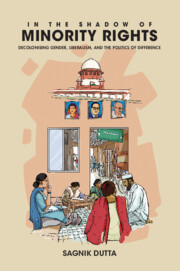
- Publisher:
- Cambridge University Press
- Online publication date:
- March 2025
- Print publication year:
- 2025
- Online ISBN:
- 9781009582025

How and where do religious minorities claim their rights? This book challenges abstract liberal approaches to minority rights and colonial constructions of the minority. It charts a new way of understanding minority rights based on an exploration of the everyday life of Muslim women's activism in Mumbai and its intersection with transnational feminist networks and a global politics of Islamic reform. It shows how women deploy everyday ideas of ethics and bodily practices to challenge inequality in Muslim family law. They construct a just community based upon the ethical ideals of the Quran and rights guaranteed by the Indian Constitution and negotiate for rights within homes, police stations, and neighbourhoods in ghettoes. Everyday familiarity is interlaced with violence in women's interactions with the state and non-state actors as they claim their rights, and practices of ethics and intimate negotiations with processes of ghettoisation and violence shape the everyday life of rights.
‘Dutta's book is both valuable and timely. In an era where discussions of processes of ‘decolonisation' are becoming widespread, they provide a valuable corrective: by deploying ethnographic methods, they demonstrate the way in which such processes are lived and practised rather than engaging with them in purely theoretical terms. Indeed, by examining the practical ways in which minority rights and gender are experienced and negotiated in localised settings, Dutta presents a cogent argument that abstract conceptions of rights are insufficient in making sense of complex social and cultural dynamics. The book is a wonderful entrée into a practical and experiential form of comparative political theory that presents a substantive challenge for contemporary political theory, namely, how do theorists comprehend the differences between the practice of political theory and the practices of its individual and collective subjects?'
Adrian Little - University of Melbourne
‘In this highly readable book Dutta highlights with immense sensitivity the role of women led sharia courts, used primarily by working class Indian Muslim women, in pushing against both a hostile majoritarian state and entrenched patriarchal social norms. In the process readers gain an invaluable insight into ethically and spatially grounded activism that challenges the binaries which continue to dominate political theory debates about secularism and religious politics, minority rights and gendered empowerment, as well as the agency of the oppressed.'
Humeira Iqtidar - King's College London
‘Sagnik Dutta's book focuses on an aspect that the feminist movement in India has taken seriously since the 1990s in the debate over a Uniform Civil Code, what has come to called ‘reforms from within'. Rather than uniformity, the feminist movement has taken gender justice to be the goal of legal reforms of personal laws, thus accepting legal pluralism as a positive value. In this emerging field, Dutta's study is an invaluable contribution, drawing attention to religiously observant Muslim women who attempt to make space for equality and justice within scriptural provisions, the Constitution remaining as an ethical horizon. Dutta's study of everyday activism of Muslim women demonstrates in a granular manner how they shape an ethical practice of justice by negotiating both formal laws and the everyday violence of patriarchy and majoritarianism.
Nivedita Menon - Jawaharlal Nehru University
‘In the Shadow of Minority Rights provides an innovative and necessary approach to minority rights that moves beyond the language of liberalism, and liberal nationalism. Drawing upon ethnographic research in Mumbai, this feminist and postcolonial analysis challenges some of the core methodological presumptions of political theory as it offers a novel and important analysis of the gendered, institutional politics of minority rights in India.'
Jeanne Morefield - University of Oxford
 Loading metrics...
Loading metrics...
* Views captured on Cambridge Core between #date#. This data will be updated every 24 hours.
Usage data cannot currently be displayed.